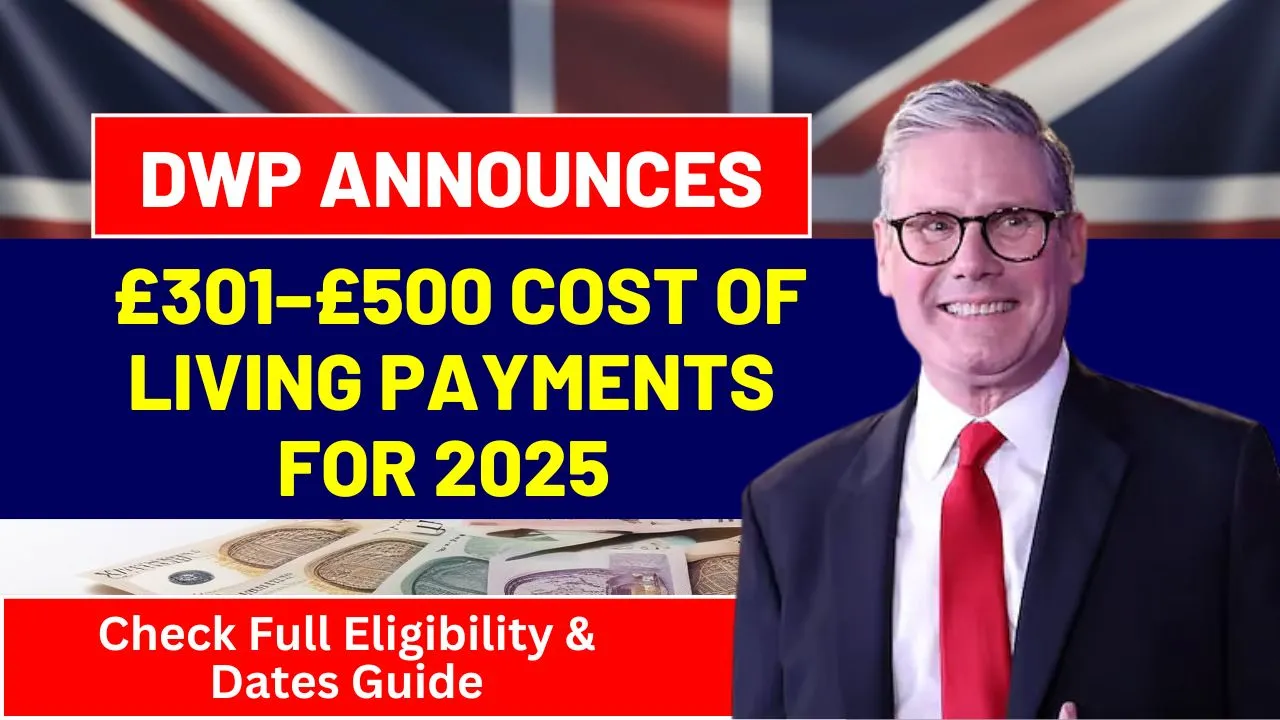£250 Cost of Living Payment: As the cost of living continues to rise, many UK families are finding it harder to keep up with essential expenses. With inflation pushing up the prices of food, energy, and rent, the financial pressure on low to middle-income households has intensified. Recognising this ongoing crisis, the UK government has rolled out a support measure under the extended Household Support Fund. This initiative, backed by the Department for Work and Pensions (DWP), offers a timely financial boost for those who need it most.
The latest update includes a one-off £250 cost of living payment specifically aimed at households earning less than £40,000 a year. Local councils will oversee the distribution, ensuring the payment reaches those in genuine need. Whether you’re struggling to pay energy bills or cover food costs, this payment is intended to offer direct, practical relief.
£250 Cost of Living Payment July 2025
The £250 Cost of Living Payment July 2025 is a targeted grant under the seventh phase of the Household Support Fund. It’s not a universal benefit, but a means-tested form of assistance administered by local authorities. Each council sets its own eligibility conditions within a national framework, meaning the type of support—whether in cash or in-kind—can vary by location. What remains constant is the purpose: to help vulnerable families manage essential living costs such as food, utilities, transport, and other basic needs. This approach allows councils to address the specific issues facing their communities while following DWP guidelines.
Overview Table
| Criteria/Detail | Information |
| Payment Amount | £250 (one-off grant) |
| Eligibility Income | Less than £40,000 net household income per year |
| Savings Limit | Under £1,000 in accessible savings |
| Eligible Benefits | UC, JSA, ESA, IS, WTC, CTC, Pension Credit, PIP, DLA, Attendance Allowance |
| Application Authority | Local councils |
| Payment Schedule | 17 July 2025 – 30 July 2025 |
| Disbursement Method | Direct bank deposit |
| Proof Required | Income evidence, utility bills, bank statements |
| Support Format | Cash grant or in-kind (e.g. white goods, food) |
| Fund Validity | Household Support Fund extended to 31 March 2026 |
What Is the £250 Cost of Living Boost?
The £250 payment is part of a larger effort to shield families from the ongoing effects of inflation and economic instability. This grant aims to help with daily essentials, from paying utility bills to purchasing food and basic household items. In some cases, councils may provide goods directly instead of issuing cash, to ensure the assistance addresses specific household needs. This flexibility is critical in adapting the aid to the diverse challenges faced by families across different regions.
Designed with both income limits and savings thresholds in mind, the scheme provides targeted support that avoids blanket handouts and ensures responsible public fund use.
Eligibility Criteria for the £250 Payment
Eligibility for this payment depends on several factors, primarily set by local authorities. However, the national framework provides the following general guidelines:
- Household income must be below £40,000 annually after tax and deductions.
- Savings should not exceed £1,000, particularly in liquid assets.
- Applicants must reside in a council area participating in the Household Support Fund.
- You must demonstrate genuine financial hardship, such as being behind on bills or unable to afford essentials.
Each council may require specific documentation such as recent bank statements, utility bills, or proof of benefits received. Ensuring these are up-to-date can improve your chances of receiving support without delays.
Who Else Can Get the £250 Support?
Besides income-based eligibility, benefit claimants also qualify, provided they were receiving specific benefits between 15 January and 28 February 2025. Eligible benefits include:
- Universal Credit
- Jobseeker’s Allowance (income-based)
- Employment and Support Allowance (income-related)
- Income Support
- Working Tax Credit
- Child Tax Credit
- Pension Credit
- Personal Independence Payment (PIP)
- Disability Living Allowance (DLA)
- Attendance Allowance
This marks a key development: claimants of PIP, DLA, and Attendance Allowance—who were previously excluded—are now included, recognising the higher costs associated with disabilities and long-term illnesses.
Payment Schedule and Method
Families approved for the grant will receive the payment between 17 July and 30 July 2025. Here are the key details:
- Method: Direct deposit to the bank account on file with your local council.
- No cheques or paper vouchers will be issued.
- Some councils may substitute the cash payment with essential goods such as food packages, clothing, or white goods like refrigerators and washing machines.
- Timely application and accurate documentation are crucial to avoid delays.
Councils advise households to ensure their bank details and personal information are current, as any discrepancies could delay payment.
Why This Support Matters
The financial pressure caused by inflation is not limited to food and fuel. From rent increases to rising public transport costs, UK households are facing an economic squeeze from multiple directions. For many, the difference between staying financially afloat and falling behind lies in modest but well-timed assistance.
The £250 Cost of Living Payment July 2025 serves several purposes:
- Prevents families from accruing debts due to unpaid utility bills.
- Supports parents in meeting daily nutritional and educational needs for their children.
- Reduces reliance on high-interest borrowing or emergency credit.
- Provides disability households with the flexibility to meet specific medical or care-related expenses.
This type of targeted financial help offers immediate relief while also promoting long-term stability.
What You Should Do Now
If you believe your household qualifies, it’s important to act quickly and stay organised:
- Check your council’s official website for eligibility details and application procedures.
- Prepare your documents: gather recent bank statements, proof of income, and any relevant bills or benefit letters.
- Submit your application early, ideally before the official payment window begins.
- Follow up if you haven’t received a response within two weeks of applying.
- Keep records of your communication with the council for future reference.
Timely action can help avoid complications and ensure the funds are disbursed to your account without delay.
FAQs
1. What is the deadline for applying?
There is no fixed national deadline, but local councils often operate on a first-come, first-served basis. Apply as early as possible once your local authority opens applications.
2. Can I receive the £250 payment if I am already getting Universal Credit?
Yes. Universal Credit recipients are among those eligible, provided they meet the income and savings criteria or were receiving benefits within the specified timeframe.
3. What if my council offers goods instead of money?
Some councils may offer items like food or white goods instead of a cash grant. This depends on local policy and funding availability.
4. Will this payment affect my other benefits?
No. The £250 payment is classified as a discretionary support grant and does not impact your entitlement to other benefits.
5. How do I know if my council is participating?
Visit your local council’s official website or contact their support office to confirm participation in the Household Support Fund scheme.
Final Thought
The £250 cost of living payment in July 2025 could be the crucial support your household needs during these challenging times. As inflation continues to impact daily living costs, targeted relief like this plays a vital role in protecting families and helping them stay financially secure.
Don’t delay—check your eligibility today, gather the necessary documents, and apply through your local council. Whether you receive the payment in cash or as direct support in kind, this initiative is designed to ease the pressure where it’s felt the most. Share this information with anyone who may benefit and make sure those around you also get the help they need.











